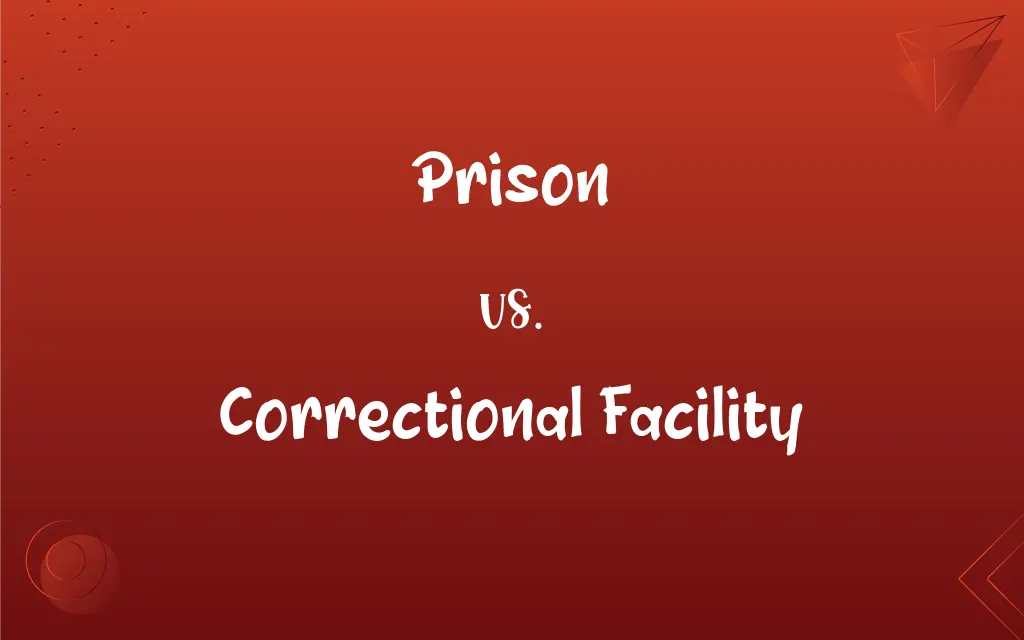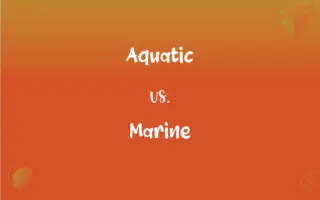Prison vs. Correctional Facility: What's the Difference?
Edited by Aimie Carlson || By Harlon Moss || Published on November 27, 2023
A prison is a facility for confining criminals, often with a focus on punishment, while a correctional facility is a broader term that includes prisons but emphasizes rehabilitation.

Key Differences
A prison is a secure facility where individuals convicted of crimes serve their sentences, often focusing on punishment and deterrence. In contrast, a correctional facility, while also housing criminals, places a greater emphasis on rehabilitation and reform.
Prisons are typically operated by government agencies and are known for their strict regimes and limited freedoms. Correctional facilities, however, can include a variety of institutions, such as halfway houses or rehabilitation centers, which offer more programs aimed at reintegrating individuals into society.
The term prison is often associated with longer sentences and more serious offenses. Correctional facilities, on the other hand, may house individuals for shorter periods and offer educational, vocational, and therapeutic programs.
Prisons usually have a rigid security structure, with inmates having limited contact with the outside world. Correctional facilities, while also secure, may provide more opportunities for inmates to engage in activities that prepare them for life after release.
The environment in prisons is often harsh and punitive, focusing on isolating offenders from society. In contrast, correctional facilities aim to correct behavior through a variety of programs and interventions, fostering an atmosphere of rehabilitation.
ADVERTISEMENT
Comparison Chart
Primary Focus
Punishment and containment of criminals.
Rehabilitation and reformation of offenders.
Type of Offenses
Typically for more serious crimes.
Can include a range of offenses.
Length of Stay
Generally longer sentences.
Can vary, often shorter than prisons.
Security Level
High, with strict regulations.
Varies, often less restrictive than prisons.
Rehabilitation Programs
Limited, focused more on containment.
Emphasizes educational and therapeutic programs.
ADVERTISEMENT
Prison and Correctional Facility Definitions
Prison
A building where people are legally held as a punishment for a crime.
He was sent to prison for five years.
Correctional Facility
A secure place providing care, education, and therapy to offenders.
This correctional facility specializes in juvenile offenders.
Prison
A state of being confined in such a place.
She felt like she was in a prison of her own making.
Correctional Facility
A place where offenders are sent as an alternative to prison.
He was transferred to a correctional facility for rehabilitation.
Prison
A place or situation characterized by restriction or lack of freedom.
His office job felt like a prison.
Correctional Facility
An institution focused on reforming rather than punishing criminals.
The correctional facility offered various vocational training programs.
Prison
A system or condition of confinement or captivity.
The regime turned the country into a virtual prison.
Correctional Facility
A facility that includes prisons, probation, and parole services.
The correctional facility oversees the rehabilitation of former inmates.
Prison
An institution for the incarceration of people convicted of serious crimes.
The new prison houses over a thousand inmates.
Correctional Facility
A system designed to correct and reintegrate offenders into society.
She worked in a correctional facility focusing on behavioral therapy.
Prison
A place for the confinement and punishment of persons convicted of crimes, especially felonies.
Prison
A state of imprisonment or captivity
Years spent in prison.
Prison
A place or condition of confinement or restriction
Felt his job had been a prison.
FAQs
Are there educational programs in prison?
Some prisons offer limited educational or vocational training.
What is a correctional facility?
A broader term for institutions aimed at rehabilitating offenders.
What is a prison?
A secure facility for confining criminals, focusing on punishment.
What types of crimes lead to prison sentences?
Serious offenses like murder, robbery, and violent crimes.
Do correctional facilities focus on mental health?
Many offer mental health services and therapy programs.
Are correctional facilities only for criminals?
Primarily, but they also offer services like probation and parole supervision.
How long are sentences in prison?
They can range from a few years to life, depending on the crime.
Can juveniles be sent to prison?
Juveniles are typically sent to juvenile detention centers, not adult prisons.
What's the difference in security between prisons and correctional facilities?
Prisons generally have higher security than many correctional facilities.
Is rehabilitation a focus in prison?
It's secondary to punishment in most traditional prisons.
Can someone in a correctional facility leave for work?
Some facilities have work release programs under strict conditions.
Do correctional facilities help with job placement?
Many have programs to assist with post-release employment.
Are there private prisons and correctional facilities?
Yes, some are operated by private companies.
What's a minimum-security prison?
A less restrictive prison for low-risk offenders.
Can you visit someone in a correctional facility?
Yes, but policies vary by institution.
Are correctional facilities state or federally run?
They can be either, depending on the institution.
Do prisons have different levels of security?
Yes, ranging from minimum to maximum security.
What is parole?
Early release from prison under supervision.
What's the role of a prison warden?
To oversee the operation and management of a prison.
What happens after release from a correctional facility?
Offenders often enter a probation period or reintegration programs.
About Author
Written by
Harlon MossHarlon is a seasoned quality moderator and accomplished content writer for Difference Wiki. An alumnus of the prestigious University of California, he earned his degree in Computer Science. Leveraging his academic background, Harlon brings a meticulous and informed perspective to his work, ensuring content accuracy and excellence.
Edited by
Aimie CarlsonAimie Carlson, holding a master's degree in English literature, is a fervent English language enthusiast. She lends her writing talents to Difference Wiki, a prominent website that specializes in comparisons, offering readers insightful analyses that both captivate and inform.






































































